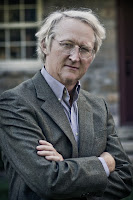Today I welcome back Edgar Award winning author Eliot Pattison.
Described as "a writer of faraway mysteries," Eliot Pattison is an international lawyer whose travel experiences span a million miles of global trekking and who has advised foreign governments and intersected with many cultures and value systems. He brings his social and cultural concerns to his fiction in three acclaimed mysteries series: the Edgar award-winning Inspector Shan Series, set in China and Tibet, the Bone Rattler series, set in Colonial America, and the Ashes of the Earth series, set 20 years after a global nuclear holocaust. His latest in the series is Original Death (Counterpoint Press/August 2013). For more info visit: www.eliotpattison.com
Eliot Pattison:
On the Importance of Historical Novels
We are creatures made up of stories. From the time men first took lightning-struck fire into a cave and circled around it we have recounted tales of our forebears, our hunts, our dreams, our journeys, our joys and our woes. Stories are our spiritual DNA. Enough humans repeating enough stories create a culture. A few decades of telling those stories can define a civilization. But somewhere along the way we lost the significance of storytelling. Our histories, our tales of ourselves, grew sterile. They lost the human element, they lost the anchors that create meaningful stories and, more importantly, that define a people.
Leafing through a modern history text is slow torture for me. Those volumes offer no sense of the wonder of our history. They turn their backs on the amazing tales of whom we have been. They are barren, rote accounts laden with statistics. Reflecting our culture’s obsession with celebrity, they ignore the breathtaking journey that has brought us to the present in favor of shallow treatments of past celebrities. They replace the amazing kaleidoscope of our past with lifeless graphs and charts. It should be no surprise that tests show that only twelve percent of our high school seniors rate as proficient in history, or that the average college student’s knowledge of history steadily declines during his or her four-year tenure. When our teachers and textbook authors have lost their excitement about our past there is no hope that they will instill excitement in their students. This is not merely a problem for our educational system, it is a profound problem for our culture. The late Michael Crichton summed up the dilemma perfectly when he said “if you don’t know history then you don’t know anything. You are a leaf that doesn’t know it is part of a tree.”
Modern history texts evade their essential task. We are not about dates of wars and lists of documents. We are about the songs of Roman children, the brushstroke of the Sung dynasty poet, the tears of Iroquois widows and the salt spray off the bow of a Viking longship. It is much more important for us to feel the thrill of early travelers when they encountered the Silk Road or the jaw-dropping experience of holding one of the first printed books than to know the succession of Tudor kings. These are the images and stories that bind us to our forebears. These are the tales that excite us about being human, that resonate at a visceral human level—and history texts ignore them. Historical novels, done well, fill that gap. They immerse us in those vital stories, connect us to the earlier participants in the human struggle whose blood flows in our veins. We have such novels because our histories aren’t good enough.



2 comments:
The succession of the Tudor Kings, or the American Presidents or any other ruling class should provide the framework, the skeleton upon which the stories of "us" hang. It is historical fiction that provides the skin tone, hair color and musculature of our history.
Thought provoking essay. Thank you.
No argument from me. I love historical mysteries.
Post a Comment